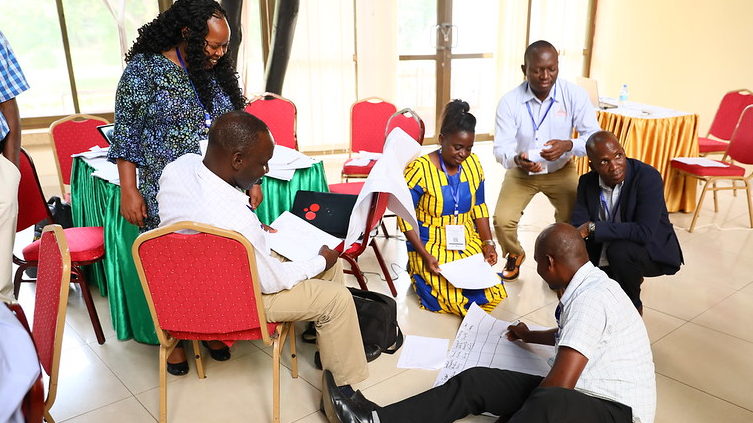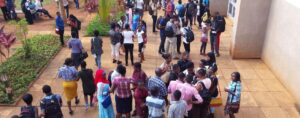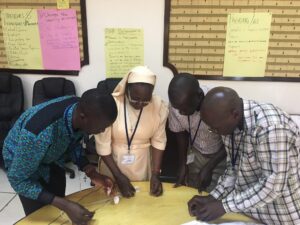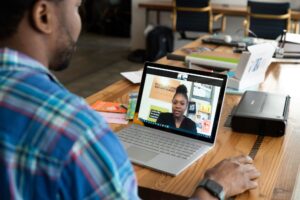
Pivoting to remote support for transforming higher education: what we have learnt
Tabitha Buchner and Josie Dryden reflect on feedback and lessons learnt from an online course to support higher education transformation in East Africa – and look ahead to how these lessons are feeding into future developments.
Earlier this year, as the impacts of COVID-19 on travel and face-to-face meetings became more obvious, we were forced to reconsider how to continue to work with our partners on the Transforming Employability for Social Change in East Africa (TESCEA) project.
The TESCEA partnership includes four universities in Tanzania and Uganda which, along with two Kenyan partners and INASP, are developing new approaches to higher education teaching so that students can leave university better equipped with the critical thinking and problem-solving skills that they will need in the workplace and to contribute positively in wider society. Key to achieving sustainability with this work – for the four universities in the partnership and for others in the region – is for people who have been through the process of course design to be equipped to help others to do the same.
This is what we in TESCEA call “multipliers”. For the latter half of the TESCEA work (TESCEA started in 2018 and finishes next year) we had planned to hold face-to-face workshops to continue equipping teaching staff to pass on what they had learnt. We have written previously about the challenges involved in shifting this activity online and about how we went about it. But what did we learn and what impact will this learning have on future work?
It was with mixed feelings that we started the process of shifting multipliers training online. Although INASP has had plenty of good experiences with both large-scale and more targeted online courses, TESCEA workshops until COVID-19 restrictions had all been face-to-face. They relied heavily on group work and both formal and informal one-to-one discussions, moving post-it notes, writing together on large sheets of paper around and sharing ideas and concerns. We were not sure how much of that personal aspect of the work could be successfully pivoted online.
In fact, the first course, which INASP and Association for Faculty Enrichment in Learning and Teaching (AFELT; one of the Kenyan partners in TESCEA) held in June, worked better than we expected. Much credit for this goes to the participants for their enthusiasm, engagement and dedication. This recent post about gender-responsive pedagogy gives a sense of the level of engagement in discussions and the desire to find solutions.
The following are some key things that we found that worked well:
- Mentoring and group work – A key component of the multiplier course was that participants were organised into small groups with five or six participants and a member of INASP or AFELT staff as a mentor. As with any group activity, the group dynamics varied from group to group and engagement between participants from different universities could have been better (an issue that was complicated by each university operating with different restrictions in place). However, overall, the feedback was positive and participants overwhelmingly said they want more such engagement in the future.
“Mentors were flexible and facilitated the training by responding to every idea posted during discussion by giving critical comments and feedback, giving assignments, instructions and course materials which made the training participant-centred and this was very interesting. I also like the engagements during zoom drop-in clinic which gave opportunity for more sharing with facilitators in large and small groups giving more clarifications and responding to queries raised.”
- Easier access to support – In a face-to-face workshop, time to engage with facilitators is limited and participants all need support during the same time slots. In a facilitated online course, it is easier for participants to post a question or discussion point whenever they want and the facilitators will answer afterwards.
- Longer time for reflection – Unlike face-to-face workshops, where there is an intense focus on the training during the workshop period, learning over the course of a few weeks gave participants more time to reflect on the activities and discuss.
- Opportunity to try new approaches – Lecturers around the world have been required to adapt to working online in ways they often may not be familiar with. Participants in the multiplier course said that participating in an online course themselves gave them the opportunity to experience some new tools and approaches to bring into their own online teaching.
“The training has enhanced my skills of engagement with teaching and learning technology.”
However, we found that some things worked less well. Unlike in a face-to-face environment where all participants usually finish together, just under half of the 40 participants completed the online multiplier course in June, although several more were very close to completion.
- Time pressures – The biggest issue for participants was time. All of those who didn’t complete mentioned time in their feedback. This was a particular issue for the teaching staff from Tanzania. Shortly before the course was due to start, Tanzanian universities reopened and, with no extension to term length, teaching staff found themselves working very long days to help their students catch up with work missed during lockdown, often teaching the same lecture or tutorial more than once in a day. It was notable that completion rates amongst Tanzanian participants were lower than those for Ugandans. It was also notable that the busiest time on the course was at the weekends. The dedication to take time on their weekends to work on the course was an important reminder that non-completion was not because of lack of motivation.
- Lack of immediate responses – Despite the positive feedback about helpful engagement with mentors, the asynchronous nature of much of the interaction was a downside for some participants. Not everyone was in the same time zone and, as many participants worked on the course in their evenings and weekends, facilitators were sometimes not able to respond to queries until the next day. For people used to immediate responses in a face-to-face conversation at a physical workshop, this required some adjustment.
- Connectivity and timetabling issues – Although there were some live discussions via zoom, connectivity issues and timing clashes meant that these were sometimes poorly attended.
“I was teaching at [the time of the live sessions] and missed all the sessions – the weekend or evenings would be preferable.”
A follow-up course
Many of the challenges discussed above are external factors, outside the scope of what the TESCEA partnership can address. However, feedback has been very useful in shaping future plans and helping us to adapt to minimise the impact of these factors. As we write, a second online multiplier course is taking place, facilitated by our partners at AFELT, and we are already drawing on some key lessons from the first round:
- Choose a time that works best for participants – The current course is specifically for those who were unable to complete the first course, mainly the Tanzanian participants. The timing was chosen to fit as well as possible with a less busy time in the Tanzanian academic schedule, between the end of teaching and the start of the exam period.
- Manage expectations and provide a roadmap for learners – The content of the second course is almost identical to the first. However, we have added to and clarified the material in places. With the first course, we were to some extent writing the course as it went along, so we could respond to the needs identified in the initial weeks. This enabled us to be flexible and responsive to participants’ priorities. However, some participants felt it would have been useful to have a roadmap of the whole course at the start. We have therefore provided that in the second iteration.
- Provide support with the learning technology – Some participants also indicated unfamiliarity with the technology that we used (the open-source Moodle platform). The current course therefore included an introductory session on using the platform, as well as more technical support.
- Integrate different experiences – AFELT recognises that the participants in the current course dropped out at various stages in the first course. The facilitators are therefore working to integrate all the different experiences together and supporting the various levels of familiarity. Where possible, all participants have been encouraged to join from the start, ideally sharing their experiences with others in their groups.
Next steps
The positive experience of the first multiplier course, as well as the valuable feedback from participants, has given us confidence to continue developing alternatives to face-to-face workshops as the pandemic continues. It is also contributing to development of the wider set of resources that will result from TESCEA. These wider resources will hopefully benefit the wider higher education community in East Africa as universities seek to support their students to develop the key soft skills that they will need for the world beyond university.
Cover picture taken at a face-to-face workshop at Mzumbe University in 2019; personal interaction is a challenge to replicate in an online environment.
***
Transforming Employability for Social Change in East Africa (TESCEA) is helping young people in Tanzania and Uganda to use their skills and ideas to tackle social and economic problems. With partners in Tanzania, Uganda and Kenya, TESCEA supports universities, industries, communities and government to work together to create an improved learning experience for students – both women and men. This improved learning experience fosters the development of critical thinking and problem-solving skills, and allows for practical learning beyond the classroom that improves a graduate’s employability.
The TESCEA partnership is led by INASP (UK), working with Mzumbe University (Tanzania), University of Dodoma (Tanzania), Gulu University (Uganda), Uganda Martyrs University (Uganda), Association for Faculty Enrichment in Learning and Teaching (Kenya) and Ashoka East Africa (Kenya).
TESCEA is funded by the UK’s Foreign, Commonwealth & Development Office (FCDO) as part of its SPHEIR (Strategic Partnerships for Higher Education Innovation and Reform) programme to support higher education transformation in focus countries in Sub-Saharan Africa, Asia and the Middle East.
To learn more about TESCEA, click here.

 Previous Post
Previous Post Next Post
Next Post


